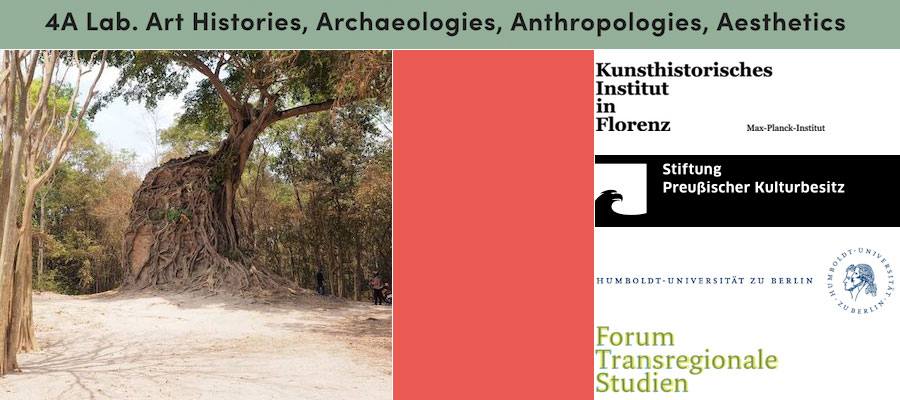The Berlin-based research, fellowship, and mentorship program 4A_Lab invites excellent early career and mid-career scholars to apply for up to two doctoral and five postdoctoral residential fellowships (10 to 15 months), in the framework of the 2019 – 2024 focus theme: Aesthetics, Art and the Ecology of Plants. Environmental, Social, and non-Human Perspectives OR in the general research framework of the 4A_Lab: Art Histories, Archaeologies, Anthropologies, Aesthetics, studied critically with and through archives, collections, and environments.
4A_Lab is a joint program of the Kunsthistorisches Institut in Florenz – Max-Planck-Institut, and the Stiftung Preußischer Kulturbesitz in collaboration with Forum Transregional Studies, the University of the Arts, Berlin (UdK), and other partners. The 4A_Lab connects disciplines, collections and institutions. It attempts to foster dialogue and exchanges between disciplines, and promotes methodological inquiries in relation to the ecologies of objects or things, collections and archives, in particular – but not only – of those kept in the Prussian Cultural Heritage Foundation.
The 4A_Lab invites researchers to study aesthetic or artistic practices and the ecology, materiality, mediality, mobility and agency of objects, and related discourses. It focuses on objects, practices, environments, and narratives (OPEN) in their historical, social and historiographical dimensions, including histories of collecting, display, or dispossession, in a conversation that transcends geographical and chronological boundaries. The program aims to create a space for dialogue for university and museum scholars in order to strengthen transdisciplinary collaborations, to transcend the borders of the 4A disciplines, to combine skills and to foster a conversation between more conceptual and more empirical approaches. The program aspires to promote transversal networking and critical reflections on historical and contemporary challenges and concerns.
2019-2024 focus theme: Aesthetics, Art and the Ecology of Plants. Environmental, Social, and non-Human Perspectives
In recent years, plants, their ecology and human interactions with plants have been studied in a new light, in a planetary perspective, from the beginnings of human history and in the horizon of the debates on the Anthropocene. This includes research on the manifold aesthetic and artistic practices related to or based on plants.
While plants are important factors in human history, humans are leaving their imprint on the history and ecology of plants. The absence, presence and temporalities of vegetal life have always had an impact on settlements as well as urbanization processes. Moreover, plants are dominant elements in the human transformation of landscapes and environments. They are central for the history of colonialism, especially in the form of plantations. They are also protagonists in the making of – real and imagined – gardens across cultures. Plants interact with the human body and its sensorial, perceptive and biochemical apparatus, be it by means of drugs or via food and air. Flowers and fruit are significant elements or even agents in a history of smell and perfume. Plants are not only indispensable for the future of nutrition, they also come with a long past of cultivation processes that includes bioengineering.
For all of these reasons, plants and plant life have been a constant field of investigation and knowledge production, be it by practitioners such as farmers, or by scholars, such as biologists, or amateurs. The understanding of plants can be gendered or socially and culturally distinctive, with specific knowledge systems relating to certain plant environments. They come together with classification systems, taxonomies, forms of collecting and display, as in the case of botanical gardens. Not only knowledge, but also aesthetic categories have been (and will continue to be) an eminent factor in the processes of the perception, description, cultivation and appreciation of wild and cultivated plants. Artistic production and aesthetic practices based on or relating to plants are thus fields that deserve further exploration across time and space, be they historically driven by religious approaches, political interests, romanticizing views, modernist thought or eco-activism.
Artworks can rely on plants via materials like wood, pigments or dyes, textiles, and canvases. Plants appear in herbaria, drawings or photographs, or in still life painting. They are represented on tiles and pots or in architecture and all kinds of decoration. In fact, plant life or plant morphology forms the basis of the theory and the practices of ornament (or ornamentation), and might be discussed also in terms of a theory of beauty. Seeds, germination, growth are only some of the concepts or metaphors induced by plant life. Moreover, plants serve as protagonists in literature, in poetry and music as well as in religious contexts across cultures and geographies, as part of rituals or of religious veneration (bamboo, lotus, maize, pomegranate, yam, vines or sacred trees). These cultural practices can be part of larger social, political, and economic developments or constellations. In fact, plants and crops are major components in economies and thus are often at the center of social tensions or transregional conflicts.
The program welcomes projects from a wide range of topics relating to plants that place emphasis on aesthetic processes, environmental studies, ecological inquiries, history of thought, and material culture, from the 4A disciplines but also from philosophical or literary studies, in transregional perspectives.
Applicants should have obtained their master's degree or their doctorate (within the last seven years prior to their application) in one of the relevant disciplines. Applications are welcome from all regions, with various disciplinary formations.
